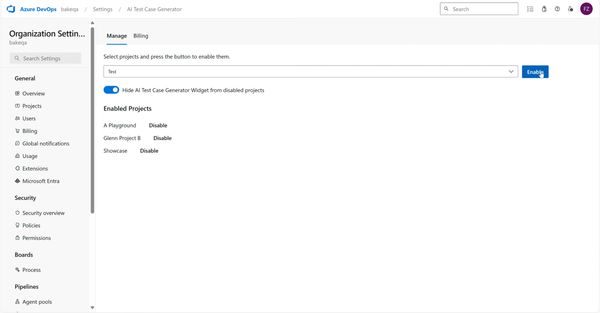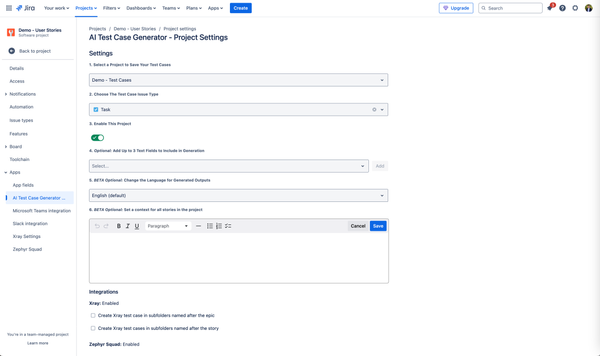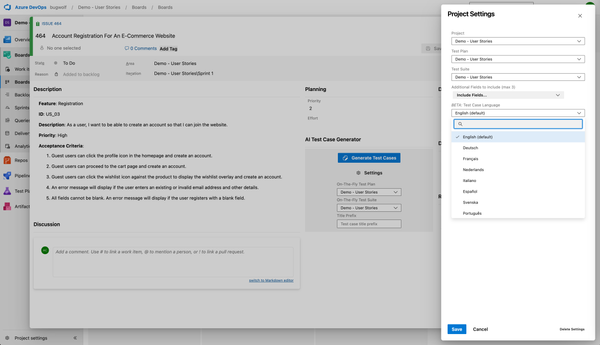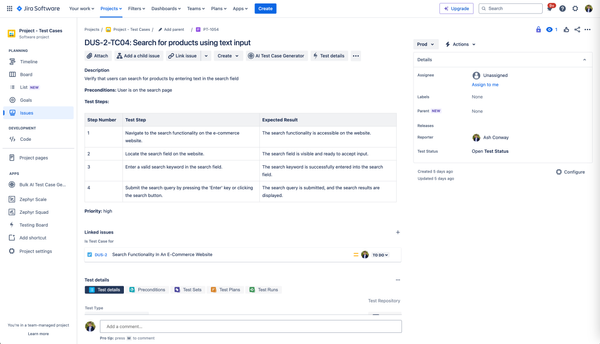AI Testing: Streamlining Quality Assurance
AI testing transforms potential into reality by integrating rigorous testing processes. Continuous performance assessment and comprehensive test coverage ensure AI systems are reliable and effective, driving innovation and delivering positive impacts in real-world applications.
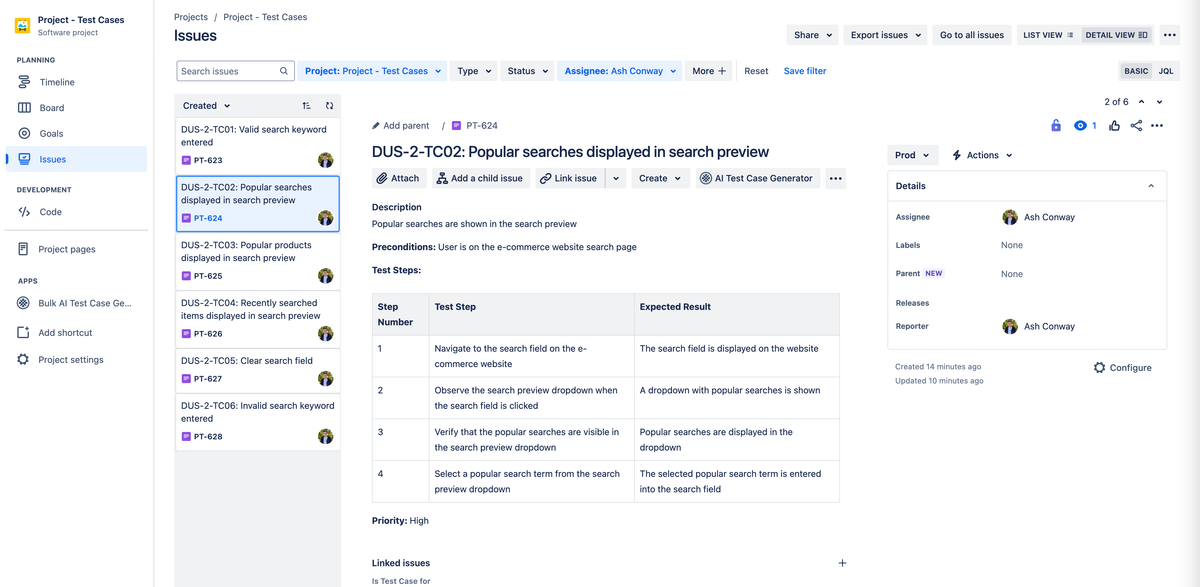
Imagine a world where AI seamlessly integrates into everyday tasks, backed by rigorous software development and testing. How can the quality and effectiveness of this AI be ensured?
Enter AI testing. Rigorous and structured AI testing elevates AI systems from being a concept, brimming with potential, to a well-oiled, highly functional reality. By continuously assessing and refining performance and ensuring robust test coverage, testers can identify dynamic solutions to emerging problems, paving the way for innovation. This focused and meticulous approach, including thorough software testing, ensures AI's positive impact and reliability in real-world scenarios.
1. Understanding AI Testing
AI testing, a crucial aspect of software testing, is an intricate process vital for the software development of reliable and efficient AI systems.
By analyzing various testing methods and techniques, including optimizing test coverage, one can ensure peak performance.
It covers several facets including functionality, usability, security, scalability, and overall test coverage, among others. Effective AI testing guarantees a solution that meets the highest standards of safety, performance, and user satisfaction.
The complexity of AI systems requires an advanced testing protocol to uncover hidden flaws and unexpected behaviors. This, in turn, helps heavily in building AI models that are not only robust and accurate but also trustworthy and reliable, ensuring a seamless integration into the intended application.
2. Benefits of AI Testing
Implementing AI testing introduces an array of advantages that fundamentally enhance the quality of AI systems.
In 2016, a prominent research journal spotlighted how automated testing significantly reduced bugs and errors, ensuring AI applications perform optimally. Enhanced performance is just one part of the benefits.
AI testing’s importance lies in its capacity to predict and prevent failures before they reach the end-user. By identifying potential issues in advance, businesses can maintain a high standard of service and avoid costly downtimes.
Moreover, embracing AI testing enables an organization to accelerate its software development cycles. This efficiency not only positions a company at the forefront of innovation but also allows it to focus resources on creativity and growth-oriented tasks.
AI testing also ensures compliance with various regulatory standards, thus safeguarding the enterprise from legal ramifications.
3. Types of AI Testing
AI testing encompasses a diverse range of methodologies, each tailored to scrutinize different facets of AI systems and their functionalities.
In functional testing, testers examine the specific outputs generated by given inputs to ensure they align with expected results, thus validating the AI's core capabilities. Performance testing, in contrast, measures the AI system's efficiency and speed under various conditions, ensuring it can handle real-world workloads without degradation.
Both “white-box” and “black-box” testing are indispensable in assessing the 'inner mechanics.'
3.1 Functional Testing
Functional testing scrutinizes the detailed functionality of an AI system. By meticulously examining outputs against expected results, testers ensure the AI behaves as intended.
Analyzing specific inputs and evaluating their resultant outputs, functional testing provides a foundational validation of an AI's core capabilities.
It is essential to validate algorithms to maintain AI system integrity.
Utilizing robust test cases, they can ascertain that the AI's actions align with predefined requirements, mitigating potential discrepancies. When done meticulously, this form of testing guarantees a high level of reliability and consistency in AI deployments.
3.2 Performance Testing
Performance testing evaluates an AI system's responsiveness and efficiency under varying conditions, ensuring robustness and reliability. It encompasses multiple facets such as speed, scalability, and resource utilization, vital for an AI's real-world efficacy.
Engaging in performance testing entails measuring response times and throughput.
By simulating real-world scenarios, testers can identify bottlenecks and evaluate the system's ability to manage increased loads without performance degradation. This rigorous approach helps in preemptively addressing potential limitations and enhances overall system resilience.
Moreover, the importance of continuous monitoring cannot be overstated. As AI systems evolve and adapt, performance metrics need regular updating to reflect their current operational state. This iterative process not only maintains high standards but also fosters innovations, ensuring AI solutions remain at the cutting edge of technology. Performance testing, in essence, serves as the bedrock for achieving peak operational excellence in AI systems.
3.3 Security Testing
Security testing in AI is pivotal to safeguarding the integrity and reliability of these advanced systems, yet often underestimated.
Since 2016, noted researchers have observed a significant increase in AI-targeted cyber attacks, drawing attention to AI systems' vulnerabilities. Hence, security testing has become an indispensable component of the AI development lifecycle.
In essence, AI's complex architectures make them susceptible to unique security threats. A comprehensive security testing strategy ensures that AI systems can withstand malicious attacks by identifying vulnerabilities and implementing robust safeguards.
Engineers must proactively secure their AI systems, starting with detailed threat modeling, penetration testing, and deploying effective countermeasures. By doing so, they can mitigate risks and maintain trust in their AI solutions.
In summary, rigorous security testing fortifies AI systems, instilling confidence and ensuring sustained operational integrity against evolving cyber threats.
4. Tools for AI Testing
In the ever-evolving field of AI, what tools do professionals leverage to ensure the robustness of their intelligent systems?
Since 2016, significant advancements have emerged, empowering experts with sophisticated tools to rigorously test AI algorithms, ensuring their reliability and accuracy. The diversity of these tools reflects the multifaceted nature of AI testing.
Today, tools like TensorFlow, IBM Watson, and Google Cloud AI provide comprehensive frameworks for validating AI models, covering everything from dataset management to performance benchmarking. These solutions facilitate a streamlined workflow.
Furthermore, specialized platforms such as DeepCode and H2O.ai emphasize automated testing, reducing human error and accelerating the validation process. Such innovations underscore the industry's commitment to excellence.
Embracing these tools drives industry progression, fostering continuous improvement and reinforcing trust in AI systems.
5. AI Testing Best Practices
Adopting best practices in AI testing can significantly enhance the quality, performance, and reliability of AI systems. Professionals must prioritize thorough and systematic testing methodologies to uncover hidden issues and optimize algorithms.
Firstly, data integrity should be ensured through rigorous preprocessing. This practice safeguards against biases and inaccuracies.
Additionally, leveraging a mix of manual and automated testing approaches allows for a comprehensive evaluation of AI models. Balancing both methods ensures a blend of precision and efficiency.
Ultimately, maintaining transparency in testing processes is paramount. Clear documentation of testing procedures, results, and iterations fosters accountability and facilitates smoother collaboration across teams, promoting an environment where continuous learning and improvement can thrive. By adhering to these best practices, practitioners contribute to the advancement and trustworthiness of AI technologies, positioning them to drive meaningful innovation.
6. Challenges in AI Testing
AI testing, though promising, poses several intricate challenges that demand both strategic and creative solutions from professionals in the field.
For instance, the inherently complex nature of AI systems presents a significant hurdle. Unlike traditional software, AI models are designed to evolve and adapt, making the prediction of their behavior an arduous task. This unpredictability can lead to inconsistencies and unforeseen outcomes that require meticulous scrutiny and debugging.
Furthermore, data quality remains a critical issue in AI testing. Ensuring that the data fed into AI systems is free from biases and reflective of real-world scenarios is paramount. Biased data can lead to skewed results and decision-making, emphasizing the necessity for comprehensive and unbiased datasets.
Finally, integrating AI testing within existing frameworks is a formidable challenge. AI technologies, with their dynamic evolution, often demand novel testing strategies. This necessitates continuous enhancement of testing methodologies and the adoption of cutting-edge tools. Nonetheless, these obstacles serve as driving forces for innovation, pushing the field towards more sophisticated and resilient solutions.
7. Future Trends in AI Testing
As advancements in technology accelerate, the landscape of AI testing is poised for significant transformation. Emerging trends promise to reshape how businesses and researchers approach the validation and monitoring of artificial intelligence systems.
One pivotal trend is the integration of autonomous AI testing frameworks, which offer real-time adaptations. These intelligent frameworks can dynamically adjust based on observed outcomes, ensuring maximal accuracy and efficiency.
Another key trend is the growing reliance on synthetic data. Generating high-volume, high-quality data artificially allows for comprehensive testing scenarios, mitigating the biases inherent in real-world datasets and enhancing algorithm robustness.
Additionally, leveraging quantum computing to augment AI testing efforts stands at the frontier of innovation. Quantum computing's unparalleled processing power could unlock new possibilities, enabling rapid and intricate testing cycles. This, in conjunction with advancements in interpretability and ethical auditing of AI systems, ensures a future where AI testing drives more effective and equitable technological solutions. AI testing is not just evolving; it is revoluting pathways to a sustainable and intelligent future.
FAQ: The Ultimate Guide to AI Testing
What is AI testing?
AI testing refers to the process of evaluating artificial intelligence systems to ensure they perform as expected. This involves validating the accuracy, reliability, and efficiency of AI models through various testing methodologies.
Why is AI testing important?
AI testing is crucial because it helps identify and rectify errors in AI systems, ensuring they operate correctly and safely. It also enhances the performance and reliability of AI applications, which is vital for user trust and regulatory compliance.
What are the different types of AI testing?
There are several types of AI testing, including:
- Functional Testing: Ensures the AI system performs its intended functions correctly.
- Performance Testing: Evaluates the system's efficiency and speed under various conditions.
- Security Testing: Identifies vulnerabilities and ensures the system is protected against threats.
- Usability Testing: Assesses the user-friendliness and accessibility of the AI application.
How do you test AI models?
Testing AI models involves several steps:
- Data Validation: Ensuring the quality and relevance of the data used for training.
- Model Validation: Checking the model's accuracy and performance using test datasets.
- Cross-Validation: Using different subsets of data to validate the model's robustness.
- A/B Testing: Comparing the performance of different models or versions to determine the best one.
What tools are used for AI testing?
Several tools are available for AI testing, including:
- TensorFlow Extended (TFX): For end-to-end machine learning pipelines.
- Apache JMeter: For performance testing.
- Selenium: For automated testing of web applications.
- IBM Watson: For AI model testing and validation.
What are the challenges in AI testing?
AI testing presents unique challenges, such as:
- Complexity: AI systems can be highly complex, making them difficult to test thoroughly.
- Data Quality: Ensuring high-quality, unbiased data is essential but challenging.
- Dynamic Behavior: AI models can change over time, requiring continuous testing and validation.
- Interpretability: Understanding and interpreting AI decisions can be difficult, complicating the testing process.
How can AI testing improve software quality?
AI testing improves software quality by:
- Identifying Bugs: Detecting and fixing errors early in the development process.
- Enhancing Performance: Ensuring the AI system operates efficiently under various conditions.
- Improving Reliability: Increasing the dependability of AI applications through rigorous testing.
- Ensuring Compliance: Meeting regulatory standards and guidelines for AI systems.
What is the future of AI testing?
The future of AI testing is likely to involve:
- Automated Testing: Increased use of automated tools and frameworks to streamline the testing process.
- Advanced Analytics: Leveraging advanced analytics and machine learning to enhance testing accuracy and efficiency.
- Continuous Testing: Implementing continuous testing practices to keep up with the dynamic nature of AI models.
- Ethical Testing: Focusing on ethical considerations and bias detection to ensure fair and responsible AI systems.
For more detailed insights and best practices on AI testing, explore our comprehensive guide on The Ultimate Guide to AI Testing.

